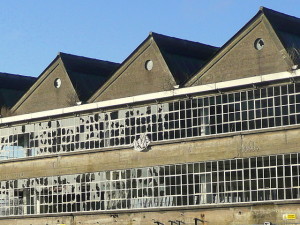By Richard Lutz
Steve comes to my house – to my drive actually – to carry out essential body work on my 11 year old Honda. Someone ripped a mega-chunk out of it in a car park. From the damage it looks as if an SUV the size of a spaceship savaged it.
Steve goes to work. Slowly over breaks, cigarettes and cups of tea, he tells his story. It is the story of Britain’s manufacturing base, the story of the West Midlands.
He was a Black Country sheet metal worker. Then at Rover, then a body repairman for various car firms.
Now he has a van, the gear and he’s giving it a go. There is little alternative. He has a family, a house, kids that want and need an education.
Steve is the story of the UK heavy industry base. Whatever skills he has have been tossed on the rubbish heap. There is little need for what he knows, what he has done, what he has learned, what he has to offer.
Thousands of workers like Steve have been hit by this massive downsizing. Some of them- Rover car workers – have been tracked by an academic team led by Professor David Bailey, now at Coventry University Business School.
He said: ‘Many got back into work after a huge effort by all involved at re-training, but with a substantial cut in real earnings and a hugely increased polarisation of incomes.’
‘Then came the recession and many lost their jobs again as they were ‘first in, first out’. So the experience for many… is of a much more precarious position after Rover. They joined what has become known as the ‘precariat’.
The world that Steve and hundreds of thousands of others live in is now profiled in a new book out this month (Surrender: How British Industry Gave Up The Ghost by Nicholas Comfort; Biteback Publishing).
It explores what has happened to Paul and the UK. And from the reviews, it seems worth a look among the plethora of handwringing angst-ridden works on how this island is sinking into the Atlantic.
Sixty years ago, the UK controlled a quarter of world manufacturing, Comfort points out that today it barely makes the 3 percent mark.
Gone are the industries in steel, coal, freight and cars. Our nuclear stations will be built by the French, vehicles factories are foreign owned and large industrial sectors have flown east.
The author asks: ‘How is it that Germany retains Seimens and France an Alstom, but there is no longer a British General Electric Company?’
Comfort cites, according to reviews, the reasons: bad management, outdated shopfloor (and union) practices; a strange relationship with European partners on the Continent; and, the loss of empire as a willingly passive customer.
Professor Bailey argues that the decline of UK manufacturing can be linked by a failure to fashion a supportive industrial policy and financial structure as in modern Germany.
As a result, he says, Conservatives then Labour allowed manufacturing to decay – and indeed speeded it along through an over-valued exchange rate.
‘We need a set of policies,’ Professor Bailey says, ‘to support modern manufacturing. Let’s hope the current government wakes up to this sooner rather than later”
For Steve, as he creates a thing of beauty out of the mangled wreckage of the back of my car, it is a worrying world that has been experienced at eye level. Hopefully, he knows that there are enough prangs and rips and bumps to keep him and his family going. Hopefully.




